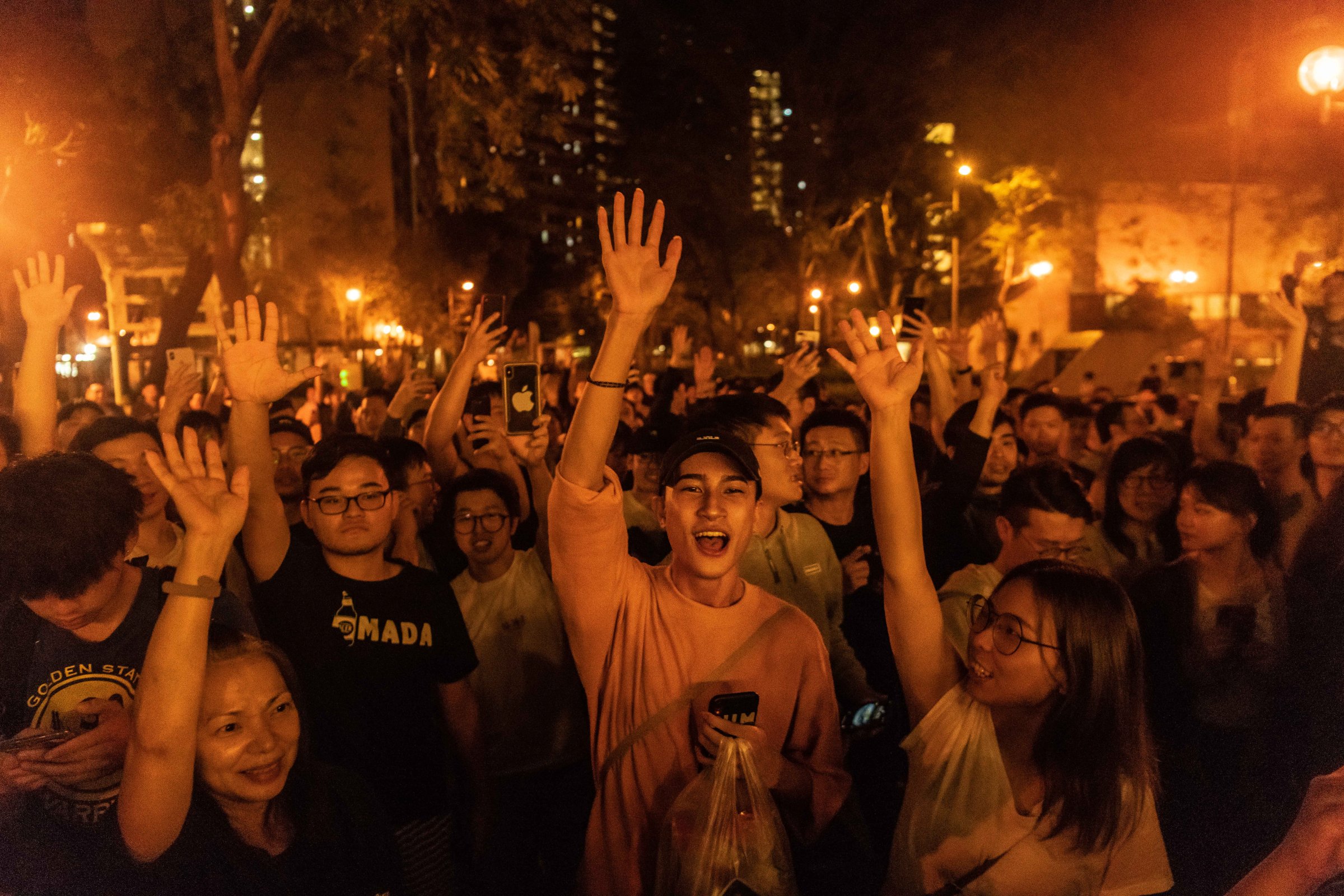
Monday’s sweeping victory in local elections by pro-democracy parties shows that establishment forces in both Hong Kong and Beijing can no longer afford to underestimate the tenacity of the ongoing movement and popular support behind genuine political reform. The peaceful conduct of the voting can be seen as a crucial window for frank and forthcoming dialogue. It would be a grave mistake for all parties to not seize this opportunity. But we cannot talk about resolution unless we get to grips with what motivates the two antagonists—the central government in Beijing, and the Hong Kong public.
Beijing’s top priority has always been to ensure that the city’s politics do not undermine national security. In 2016, the Chinese legislature’s standing committee decreed that independence activists elected to Hong Kong’s Legislative Council must be disqualified. Earlier this month, a senior adviser to the central government on Hong Kong affairs pointedly reminded the enclave that it had still to enact national security legislation. Also this month, Chinese officials criticized Hong Kong’s High Court for its overturning of a ban on masks that the local administration had introduced to deter participation in protests. Beijing has always been consistent: Hong Kong’s democratization must not come at the expense of China’s unity, and staunch, swift measures, through the judiciary and criminal justice systems, are the only response to the ongoing unrest.
Many in the former British colony, especially the young, see things very differently. Even those opposed to secession or self-determination see further political liberty as their birthright, guaranteed under Hong Kong’s post-colonial constitution. It’s also seen as a crucial step towards securing quality governance. A fully democratic legislature (presently, only half of the Legislative Council is chosen by universal suffrage) and a directly elected leader (currently selected by a college of just 1,200 electors) will make the local administration more accountable, responsive, and inclusive towards the broader public. It will also ensure that the territory’s chief executive, as the leader is known, genuinely represents the interests of Hongkongers to the central government, with a mandate to tackle issues ranging from socioeconomic inequality to uncompetitive education, housing shortages, and an economy desperately needing diversification.
Beijing need not fear this. There is no reason why a Hong Kong with greater political freedoms cannot exist within the boundaries demarcated by Chinese national interests. Indeed, through tactful and managed democratization, Beijing is likely to achieve the “returning of the hearts and minds” of Hong Kong citizens—a core objective of the Chinese Communist Party since the beginning of the Sino-British talks in the 1980s.
Such democratization could take place in key areas where—importantly and surprisingly—little has been set in stone by Beijing. One such area is the composition of the chief executive nomination committee. How the composition of the nomination committee is determined, and the broadening of the electorate that determines who gets onto this committee, could be looked at. So could the pace of democratization within the Legislative Council itself, in terms of reforming or abolishing functional constituencies—seats held by special interest groups, such as the financial, industrial and legal sectors. These are gray areas, where Beijing has in the past expressed openness to concessions and negotiations. It falls upon Hongkongers to make a case aligning Beijing’s desire for stability with their yearning for more accountable and responsive governance.
Hong Kong’s government must meanwhile set aside its approach of engaging only dominant interest groups and instead turn to setting up binding and transparent consultative platforms, where ordinary citizens not only could propose and prioritize items for governmental consideration, but also contribute towards participatory policy-making. The administration should also seek to incorporate dissenting views and construct a conducive, institutionally absorbed youth political culture, by inviting young people from ordinary and non-establishment backgrounds to critically assess or even modify policy objectives.
None of these measures contravene Beijing’s red lines. They are feasible and not merely necessary but crucial. Successful local elections have created a valuable hiatus, but Hong Kong’s future remains on a knife-edge, and every effort counts.
More Must-Reads From TIME
- The 100 Most Influential People of 2024
- Coco Gauff Is Playing for Herself Now
- Scenes From Pro-Palestinian Encampments Across U.S. Universities
- 6 Compliments That Land Every Time
- If You're Dating Right Now , You're Brave: Column
- The AI That Could Heal a Divided Internet
- Fallout Is a Brilliant Model for the Future of Video Game Adaptations
- Want Weekly Recs on What to Watch, Read, and More? Sign Up for Worth Your Time
Contact us at letters@time.com